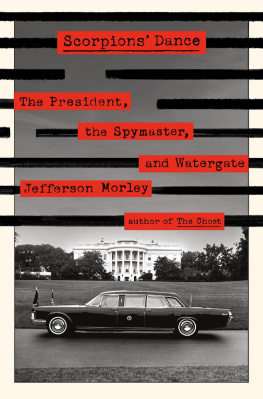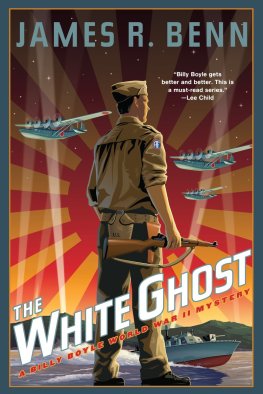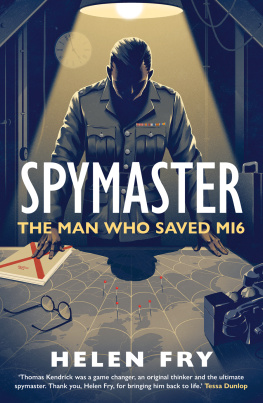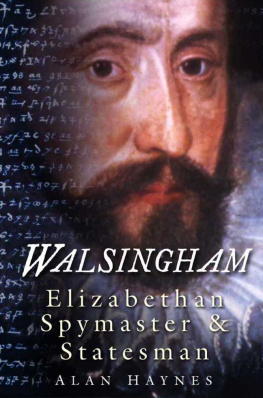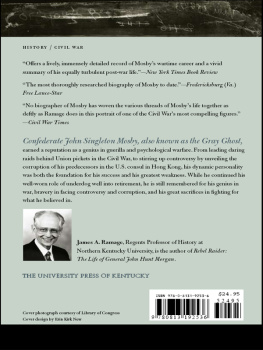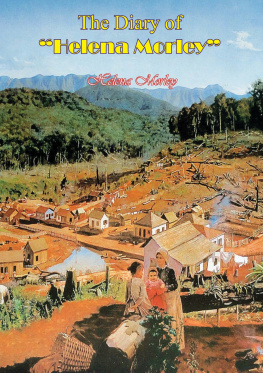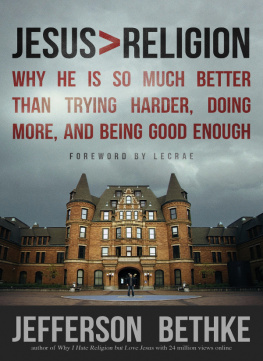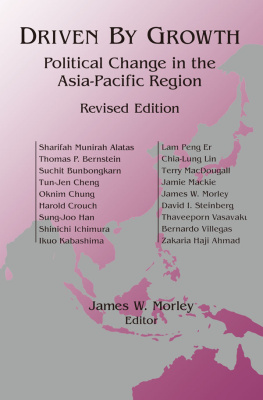Jefferson Morley - The Ghost: The Secret Life Of CIA Spymaster James Jesus Angleton
Here you can read online Jefferson Morley - The Ghost: The Secret Life Of CIA Spymaster James Jesus Angleton full text of the book (entire story) in english for free. Download pdf and epub, get meaning, cover and reviews about this ebook. year: 0, genre: History. Description of the work, (preface) as well as reviews are available. Best literature library LitArk.com created for fans of good reading and offers a wide selection of genres:
Romance novel
Science fiction
Adventure
Detective
Science
History
Home and family
Prose
Art
Politics
Computer
Non-fiction
Religion
Business
Children
Humor
Choose a favorite category and find really read worthwhile books. Enjoy immersion in the world of imagination, feel the emotions of the characters or learn something new for yourself, make an fascinating discovery.

- Book:The Ghost: The Secret Life Of CIA Spymaster James Jesus Angleton
- Author:
- Genre:
- Year:0
- Rating:3 / 5
- Favourites:Add to favourites
- Your mark:
- 60
- 1
- 2
- 3
- 4
- 5
The Ghost: The Secret Life Of CIA Spymaster James Jesus Angleton: summary, description and annotation
We offer to read an annotation, description, summary or preface (depends on what the author of the book "The Ghost: The Secret Life Of CIA Spymaster James Jesus Angleton" wrote himself). If you haven't found the necessary information about the book — write in the comments, we will try to find it.
Jefferson Morley: author's other books
Who wrote The Ghost: The Secret Life Of CIA Spymaster James Jesus Angleton? Find out the surname, the name of the author of the book and a list of all author's works by series.
The Ghost: The Secret Life Of CIA Spymaster James Jesus Angleton — read online for free the complete book (whole text) full work
Below is the text of the book, divided by pages. System saving the place of the last page read, allows you to conveniently read the book "The Ghost: The Secret Life Of CIA Spymaster James Jesus Angleton" online for free, without having to search again every time where you left off. Put a bookmark, and you can go to the page where you finished reading at any time.
Font size:
Interval:
Bookmark:
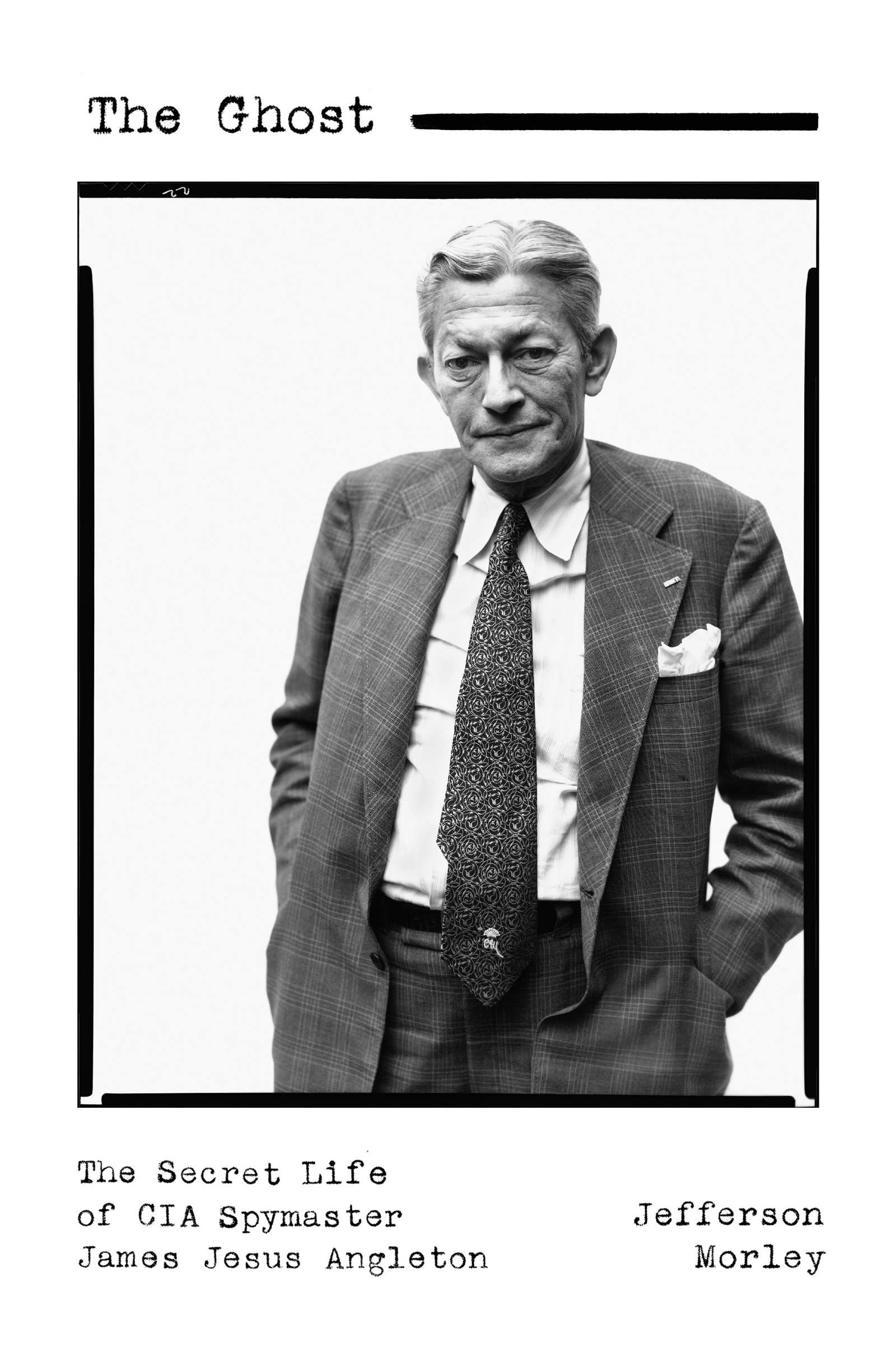

The author and publisher have provided this e-book to you for your personal use only. You may not make this e-book publicly available in any way. Copyright infringement is against the law. If you believe the copy of this e-book you are reading infringes on the authors copyright, please notify the publisher at: us.macmillanusa.com/piracy.
When I started writing the biography of James Angleton in January 2015, the notion that a deep state shaped American politics was largely unknown. When I finished The Ghost two years later, the term commanded belief from the president of the United States and a near majority of the citizenry.
In April 2017 ABC News pollsters asked Americans about the possible existence of a deep statedefined as military, intelligence, and government officials who try to secretly manipulate government policy. A plurality of respondents48 percentagreed while 35 percent described the idea as a conspiracy theory. The belief in a deep state ran equally strong among Republicans and Democrats.
I did not rely on the concept of a deep state in researching Angletons career. But I wanted to tell his story precisely because I had encountered spectral glimpses of his handiwork in my reporting for The Washington Post and for my first book, Our Man in Mexico . When I finished The Ghost, I realized Angleton and his conspiratorial mode of thinking illuminated the new discourse of the deep state.
But how? Among the various theories of the deep state, the only common denominator is the role of the secret agencies created by the National Security Actwhat Professor Michael J. Glennon calls double government. Since 1947, Glennon notes, the three branches of the republican government founded in 1789 have been joined by a fourth branch of military and intelligence organizations, which wield power largely beyond the view of the Madisonian government and the voting public.
Whatever the label applied to the national security sector of the U.S. government, Angleton embodied its ascendancy after World War II. Thus The Ghost is a biography that interrogates todays headlines: Was James Angleton a defender of the republic? An exemplar of double government? Or an avatar of the emerging deep state?
This is his story, insofar as it is known.
THE YOUNG AMERICAN PEERED through the viewfinder at the naked poet. James Angleton squeezed the shutter once and then again. Ezra Pound went right on talking, as if he didnt care. Jim, as Pound called him, had just come down from Milan. Upon arrival, the Yale man with black hair and high brown cheekbones had spotted the abode of the expatriate poet from the waterfront below. It took some ingenuity to locate the entrance to number 12 via Marsala in the narrow cobblestone street around back. He hiked up the darkened stairs to the fifth floor and emerged into the bright light of the terraced apartment, where Pound and his wife, Dorothy, welcomed him like an old friend.
In fact, that summer day in 1938 was the first time Jim Angleton and Ezra Pound had met. Pound was fifty-two years old, Angleton a rising college sophomore and expatriate resident of Italy. He knew of Pound through the crystalline poetry of his books Personae and the Cantos (Songs in English). He felt something of a personal connection, too. During his freshman year, he had come across a sketch of Pound in a campus magazine, above the caption From Idaho to Rapallo. Jim had made that same intercontinental journey. Born in Boise, he had lived there and in Dayton, Ohio, until he was sixteen years old, when his family moved to Milan. In the poets odyssey from Idaho to Italy, Angleton might have seen the arc of possibility in his own life.
Angleton was taller than his host. He had a Latin complexion and the lithe build of a soccer player. His English accent announced old-world courtesy and quiet good manners. His piercing dark eyes and the perpetual hint of a smile suggested an ironic approach to life.
The couple welcomed Angleton into their neat apartment. Pound, ever alert for potential patrons, knew of Jims father, a parvenu who ran the Italian-American Chamber of Commerce in Milan. Hugh Angleton was one of the best-known Americans in northern Italy. He mixed easily among the businessmen and officials associated with the government of Benito Mussolini. For Pound, who admired Mussolini, this was recommendation enough. He also supposed that the young Angleton could derive from his teaching a necessary education in the complexities of debt, trade, and paper money. And eventually (the poet may well have calculated), Jims father might be of some service.
For five days in August 1938, Angleton made himself at home with the Pounds. He had come in search of greatness and found it. He had read the dense poetry of The Fifth Decade of Cantos, published in 1937. He especially admired an early poem of Pounds, Hugh Selwyn Mauberley, about the universal beauty of poetry. Angleton knew, too, of Pounds interest in economics, articulated in a series of publications with pedantic titles such as ABC of Economics, Social Credit, and Jefferson and/or Mussolini the latter a frankly laudatory portrait of the Italian fascist leader. Poetry could not be insulated from revolution and money, Pound insisted. So Jim gave close attention to his political writings as well as to his poetry.
* * *
JAMES JESUS ANGLETON WAS born on December 9, 1917, the first of four children of James Hugh Angleton and his wife, Carmen Moreno Angleton. Hugh, as he was known, had grown up in central Illinois, working as a schoolteacher until he moved to Idaho, where he started out as a candy salesman. He was serving in the Idaho National Guard at a U.S. military post in Nogales, Arizona, when he met Carmen Moreno, born in Mexico but naturalized as a U.S. citizen. It was, according to one account, a case of love at first sight. The bride was one of the Spanish beauties of Nogales and exceedingly popular. Sociable and engaging, he was soon promoted.
In 1927, Hugh and Carmen Angleton moved their family to Dayton, Ohio, where Hugh became a vice president of National Cash Register. Jim attended Oakwood Junior High, a public school. In 1933, Hugh bought out NCRs Italian subsidiary and moved the family to Milan, where he opened his own company, selling cash registers and business machines. Suddenly, the candy salesman was a wealthy man.
In raising their children, Hugh and Carmen emphasized the importance of education and travel. They sent Jim to Malvern College, an exclusive redbrick boarding school in Worcestershire, England. His younger brother, Hugh, was sent to Harrow, an even more exclusive English prep school. Carmen, the elder daughter, went to a convent school in Milan and then a girls school in Switzerland. Delores, the youngest, would also go to school in England. In the summers, the family reunited in Milan.
Angletons upwardly mobile childhood was formative. By the time he arrived at Yale in September 1937, he had resided in three countries, attended public and private schools, spoke three languages, and had lived in circumstances both modest and luxurious. He was an outdoorsman with advanced tastes in poetry, an athlete with an original mind. He displayed a distinctive social style, andperceptible under the surfacean ambition fueled by the rapid success of his father.
After his freshman year at Yale, he returned to Milan for the summer. He called up the American embassy, asking for the address of the expatriate writer Ezra Pound, and he didnt relent until he was given it. Then he wrote straightaway. Jim explained he was the photography editor of The Yale Literary Magazine, not mentioning that said journal did not actually publish photographs. Receiving no answer, Jim wrote another letter in longhand ten days later.
Font size:
Interval:
Bookmark:
Similar books «The Ghost: The Secret Life Of CIA Spymaster James Jesus Angleton»
Look at similar books to The Ghost: The Secret Life Of CIA Spymaster James Jesus Angleton. We have selected literature similar in name and meaning in the hope of providing readers with more options to find new, interesting, not yet read works.
Discussion, reviews of the book The Ghost: The Secret Life Of CIA Spymaster James Jesus Angleton and just readers' own opinions. Leave your comments, write what you think about the work, its meaning or the main characters. Specify what exactly you liked and what you didn't like, and why you think so.

